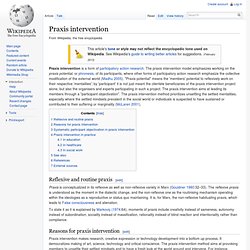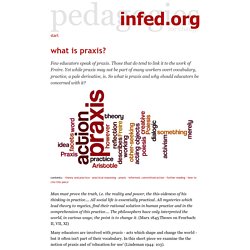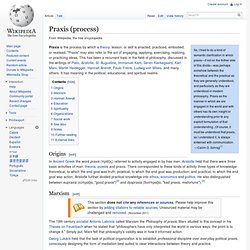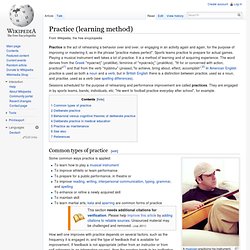

Praxis intervention. Praxis intervention is a form of participatory action research.

The praxis intervention model emphasizes working on the praxis potential, or phronesis, of its participants, where other forms of participatory action research emphasize the collective modification of the external world (Madhu 2005). "Praxis potential" means the 'members' potential to reflexively work on their respective 'mentalities'; by 'participant' it is not just meant the clientele beneficiaries of the praxis intervention project alone, but also the organisers and experts participating in such a project.
The praxis intervention aims at leading its members through a "participant objectivation". The praxis intervention method prioritizes unsettling the settled mentalities, especially where the settled mindsets prevalent in the social world or individuals is suspected to have sustained or contributed to their suffering or marginality (McLaren 2001). Reflexive and routine praxis[edit] Reasons for praxis intervention[edit] Praxis @ the informal education homepage. Contents: · theory and practice · practical reasoning · praxis - informed, committed action · further reading · how to cite this piece Man must prove the truth, i.e. the reality and power, the this-sideness of his thinking in practice....

All social life is essentially practical. All mysteries which lead theory to mystics, find their rational solution in human practice and in the comprehension of this practice.... The philosophers have only interpreted the world, in various ways; the point is to change it. (Marx 1845 Theses on Feurbach: II, VII, XI) Many educators are involved with praxis - acts which shape and change the world - but it often isn't part of their vocabulary. Theory and practice Practice is often depicted as the act of doing something.
The purpose of a theoretical discipline is the pursuit of truth through contemplation; its telos is the attainment of knowledge for its own sake. Practical reasoning The practical - making judgements Praxis: informed, committed action. Praxis (process) Praxis is the process by which a theory, lesson, or skill is enacted, practiced, embodied, or realised.

"Praxis" may also refer to the act of engaging, applying, exercising, realizing, or practicing ideas. This has been a recurrent topic in the field of philosophy, discussed in the writings of Plato, Aristotle, St. Augustine, Immanuel Kant, Søren Kierkegaard, Karl Marx, Martin Heidegger, Hannah Arendt, Paulo Freire, Ludwig von Mises, and many others. It has meaning in the political, educational, and spiritual realms. In Ancient Greek the word praxis (πρᾶξις) referred to activity engaged in by free men. The 19th century socialist Antonio Labriola called Marxism the Philosophy of praxis.
Georg Lukács held that the task of political organization is to establish professional discipline over everyday political praxis, consciously designing the form of mediation best suited to clear interactions between theory and practice. Practice (learning method) Practice is the act of rehearsing a behavior over and over, or engaging in an activity again and again, for the purpose of improving or mastering it, as in the phrase "practice makes perfect".

Sports teams practice to prepare for actual games. Playing a musical instrument well takes a lot of practice. It is a method of learning and of acquiring experience. The word derives from the Greek "πρακτική" (praktike), feminine of "πρακτικός" (praktikos), "fit for or concerned with action, practical"[1] and that from the verb "πράσσω" (prasso),"to achieve, bring about, effect, accomplish".[2] In American English practice is used as both a noun and a verb, but in British English there is a distinction between practice, used as a noun, and practise, used as a verb (see spelling differences).
Sessions scheduled for the purpose of rehearsing and performance improvement are called practices. Some common ways practice is applied: Psychologist K. Skills fade with non-use.